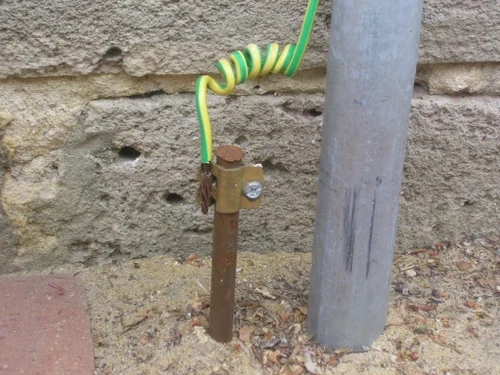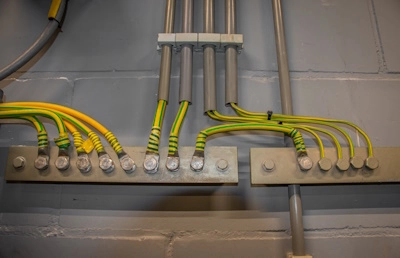Every home and business must have electrical safety, but many property owners fail to consider proper grounding, one of the most important aspects of electrical systems. Anyone who wishes to guarantee the security and operation of their electrical systems must understand electrical grounding it is not just crucial information for engineers and electricians. Everything you need to know about electrical grounding from fundamental ideas to real world applications will be covered in this extensive guide.
Although electrical grounding is the foundation of any safe electrical system many homeowners are still ignorant of how crucial it is. Knowing electrical grounding can help you make wise decisions regarding the electrical safety of your property regardless of whether you’re planning new construction or residing in a house that’s been there for decades. Everything you need to know about electrical grounding is covered in this extensive guide from fundamental ideas to real world applications.
What is Electrical Grounding?
Electrical grounding is a basic safety feature that connects your home’s electrical system directly to the ground. When electrical faults or surges happen this connection makes a safe path for the current to flow into the ground. This keeps people and property from getting hurt or damaged.
The grounding system is made up of a number of important parts that work together perfectly. Ground rods which are usually made of copper or galvanized steel are pushed deep into the ground near the electrical panel in your home. Grounding conductors which are special wires that carry fault currents safely away from your home’s electrical parts connect these rods to your electrical system.
Types of Electrical Grounding Systems

Understanding different grounding approaches helps homeowners appreciate how their electrical systems protect them in various situations.
Equipment Grounding
Tools By connecting all metal components of electrical equipment to the ground grounding helps prevent electrical shock.This equipment grounding system is connected to the third prong of three prong outlets. It establishes a secure path for fault currents to travel to ground and offers prompt protection in the event that appliance insulation fails.This system prevents users from touching energized metal surfaces by automatically tripping circuit breakers when hazardous situations arise.
System Grounding
System grounding is the process of directly connecting one electrical wire in your house to ground usually the neutral conductor. This system guarantees that protective devices like fuses and circuit breakers operate as intended and provides consistent voltage levels throughout your home’s electrical system.It lowers the possibility of hazardous voltage fluctuations improves overall electrical system performance and offers a trustworthy reference point for system operation.
Lightning Protection Grounding
Protection Against Lightning The enormous electrical energy from lightning strikes is specifically addressed by grounding. By safely channeling lightning current into the earth using specialized conductors and electrodes, this grounding system guards against lightning damage to your home’s electrical systems and structure.
Surge Protection Grounding
Protection Against Surges To divert voltage spikes from power lines or nearby lightning strikes, grounding is used in conjunction with surge protection devices.By giving surge currents a low resistance path to swiftly reach the earth, this grounding system safeguards delicate electronics.
Benefits of Proper Electrical Grounding
House electrical grounding provides numerous advantages that directly impact your family’s safety and your home’s electrical system performance.
Personal Safety
The most important benefit is personal safety. Proper grounding greatly lowers the chance of electrical shock by making sure that fault currents go to ground instead of via humans who could touch live equipment. This protection is especially important in places where water and electricity could come into contact, like kitchens, baths and outside.
Fire Prevention
Another important benefit is that it helps prevent fires. Electrical problems that don’t have the right grounding can cause deadly arcing and overheating which can start house fires. Grounding systems assist circuit breakers find and stop fault currents rapidly which stops the electrical conditions that lead to fires.
Equipment Protection
Equipment Protection helps your devices and appliances last longer. Electrical surges and voltage fluctuations can break or damage expensive equipment but grounding your gadgets properly helps maintain the electrical conditions stable and gives them surge protection routes that keep them safe.
Power Quality and System Stability
When your electrical system is stable the quality of the power in your home gets better. Grounding cuts down on electrical noise and interference that can make lights flicker motors run coarsely or electronic gadgets stop working. This stability becomes more and more critical as households add more complex electrical systems.
Code Compliance and Home Value
Code Compliance makes sure that your home satisfies the most up to date safety regulations for electrical work. There are good reasons why building rules require appropriate grounding it has been shown to save lives and protect property. Proper grounding also helps keep your property insurable and worth more when you sell it.
Why Use Electrical Grounding?

Grounding your home’s electrical system is not an option it is necessary for modern electrical safety and is required by electrical codes across the country. Homeowners can better understand the importance of grounding and make smart choices about how to maintain and upgrade their electrical systems if they know why it matters.
Almost all electrical installations in homes must be grounded, according to the law. The National Electrical Code and local building codes say that proper grounding is necessary because it has been shown to work for decades to keep electrical accidents from happening. If your home doesn’t have enough grounding, it might fail an electrical inspection and have problems with your insurance.
Where to Use Electrical Grounding
In homes, electrical grounding is needed in all areas where electricity is present but some areas need more care and specific grounding methods. Proper grounding connections should be made to every electrical outlet, light fixture and permanently installed appliance in the house. This all encompassing method guarantees that protection is always the same, no matter where electrical equipment is used or where problems may arise.
Wet areas need better grounding protection because water can carry electricity. Ground fault circuit interrupters (GFCIs) that work with grounding systems are needed in kitchens, bathrooms, laundry rooms and outside areas to find dangerous situations and turn off the power automatically.
Best Practices for Electrical Grounding
To make sure that residential electrical grounding works, you need to pay attention to how it is installed, what materials are used and how it is maintained over time. Choosing the right grounding electrodes for the soil in your area is the first step in proper installation. Ground rods work well in most situations, but rocky, sandy, or very dry soils may need more electrodes or different ways to ground themselves to get the right amount of ground contact resistance.
Long-term reliability of a grounding system depends on using high-quality materials. Copper wires are less likely to corrode than wires made of other materials. Proper connectors and clamps keep electrical connections strong, which won’t break down over time. Using the right materials keeps the system from breaking down, which could put safety at risk.
Advantages and Disadvantages of Electrical Grounding
Homeowners can make smart choices about their home’s electrical systems if they know both the pros and cons of grounding.
Some of the benefits are full compliance with electrical codes and insurance requirements, better protection against power surges and lightning strikes and better reliability and longevity of equipment.
There aren’t many downsides, but they are worth thinking about. The cost of installing the first time can be high, especially if the soil is hard to work with or if you’re upgrading an older home that doesn’t already have grounding. To keep working, ongoing maintenance must include regular inspections and tests.
Daily Usage and Practical Applications
Most homeowners don’t realize how much house electrical grounding affects their daily lives. It works all the time behind the scenes to keep the electrical system safe and reliable.
Grounding is necessary for the safe operation of everyday appliances. The grounding system keeps you safe from electrical problems that could make the metal case of a washing machine, dishwasher, or other appliance with a three prong plug live. This protection works on its own and without being seen.
Proper grounding gives electronic devices electrical stability, which is good for them. Grounding systems help keep electrical power clean and stable by cutting down on electrical noise and providing surge protection pathways. This makes computers, TVs, and smart home devices work better. For peace of mind and safety, always hire a licensed electrician to inspect or upgrade your home’s grounding system.
Frequently Asked Questions
Q: How can I tell if my home’s electrical grounding is adequate?
A: Look for three-prong outlets and grounding rods near the panel, but only a professional can confirm if grounding is truly effective, especially in homes built before 1960.
Q: Do all outlets need to be grounded?
A: Modern codes require grounding, but older homes may have ungrounded outlets. Upgrading improves safety, especially in kitchens, bathrooms and areas with appliances.
Q: What’s the difference between grounding and GFCI?
A: Grounding directs fault currents safely to the earth GFCIs shut off power if danger is detected. Both work best together.
Q: Can poor grounding harm electronics?
A: Yes, it can cause surges and damage devices. Proper grounding helps protect sensitive electronics.
Q: How often should grounding be checked?
A: Visually inspect annually. Have a pro test every 3 to 5 years or after major electrical work.
Q: Is upgrading grounding expensive?
A: Costs vary. GFCI upgrades are affordable; full grounding updates may cost more but greatly boost safety and reliability.
Conclusion
Electrical grounding is like an invisible shield that keeps families and homes safe from the dangers of electricity. Proper grounding systems keep your home’s electrical system safe and reliable by stopping deadly electrical shocks and protecting expensive electronics from power surges.
When homeowners understand electrical grounding, they can see how important it is and make sure their homes are safe. Grounding systems work behind the scenes, but they have a huge effect on the safety of people and the performance of electrical systems every day. It’s not enough to just follow the rules for proper grounding. You also need to make sure that families can safely use electricity.
